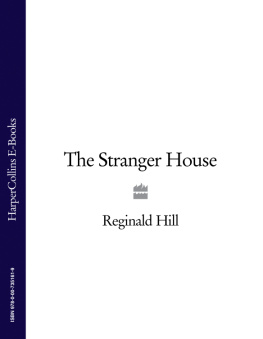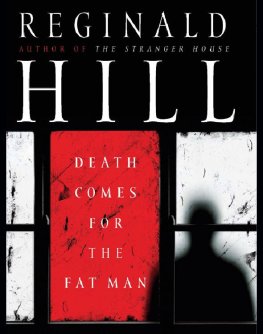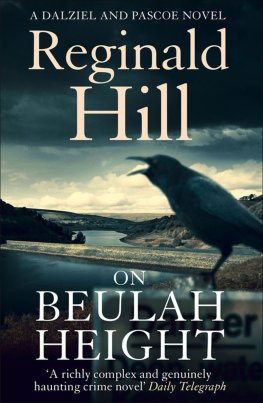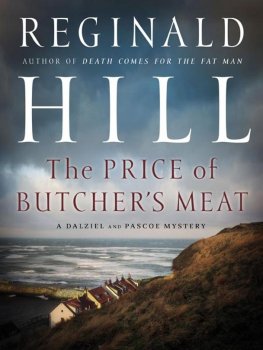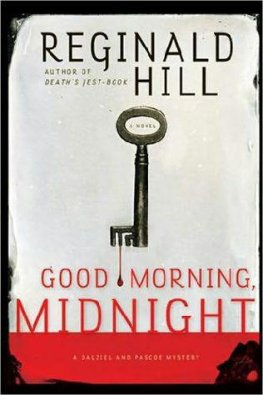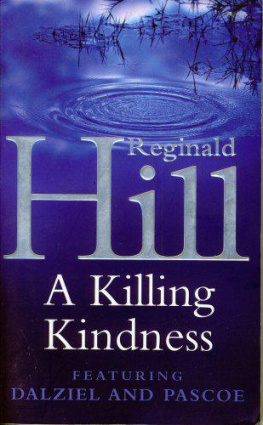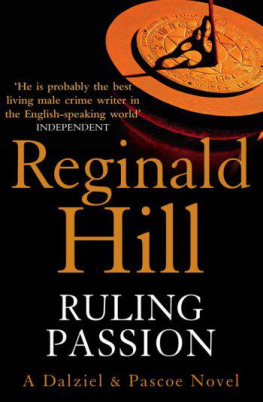Reginald Hill - Exit lines
Here you can read online Reginald Hill - Exit lines full text of the book (entire story) in english for free. Download pdf and epub, get meaning, cover and reviews about this ebook. genre: Detective and thriller. Description of the work, (preface) as well as reviews are available. Best literature library LitArk.com created for fans of good reading and offers a wide selection of genres:
Romance novel
Science fiction
Adventure
Detective
Science
History
Home and family
Prose
Art
Politics
Computer
Non-fiction
Religion
Business
Children
Humor
Choose a favorite category and find really read worthwhile books. Enjoy immersion in the world of imagination, feel the emotions of the characters or learn something new for yourself, make an fascinating discovery.

- Book:Exit lines
- Author:
- Genre:
- Rating:4 / 5
- Favourites:Add to favourites
- Your mark:
- 80
- 1
- 2
- 3
- 4
- 5
Exit lines: summary, description and annotation
We offer to read an annotation, description, summary or preface (depends on what the author of the book "Exit lines" wrote himself). If you haven't found the necessary information about the book — write in the comments, we will try to find it.
Exit lines — read online for free the complete book (whole text) full work
Below is the text of the book, divided by pages. System saving the place of the last page read, allows you to conveniently read the book "Exit lines" online for free, without having to search again every time where you left off. Put a bookmark, and you can go to the page where you finished reading at any time.
Font size:
Interval:
Bookmark:
Exit lines
Reginald Hill
Chapter 1
'I am just going outside and I may be some time.'
On a cold and storm-racked November night, while Peter and Ellie Pascoe were still celebrating with wine and wassail the first birthday which their daughter Rose had greeted with huge indifference, three old men, who felt far from indifferent, died.
Thomas Arthur Parrinder, 71, was aroused for the last time by a warm wetness amid the freezing rain which had been lashing his face for almost four hours. He opened one eye and saw above him, silhouetted vaguely against the dark sky, a long animal head with pricking ears, and he glimpsed also the gleam of tooth and inquisitive eye as the beast stooped down to lick at him once more. His mouth gaped and a rattle that may have been a laugh spilled out with it a single word. 'Polly!' No other word passed his lips, and precious little breath either, before an overworked hospital doctor pronounced him (not without some guilty relief) dead on arrival.
At just about the same time, Robert Deeks, 73, was being hooked back from a long slide to oblivion by the ringing of a distant bell. A little earlier another bell had rung for some considerable time, but that had eventually ceased. At last this new one stopped too. Then a door opened. A voice called out. Other doors. Opening and shutting. Footsteps below, hurrying, scurrying; a voice growing in volume and alarm; footsteps and voice together on the stairs, ascending. He took another lurch back to reality. He was in a bathroom, his own bathroom. To register this was quite a triumph and, thus encouraged, his mind took a further step. He was in the bath! He looked down at the russet-coloured water lapping his chest, grey and flimsy as a sodden newspaper blown against a picket fence. His mind suddenly broke through fact into feeling. It would be a shaming thing to be found in the bath, especially when he had made it so dirty. It was a special old people's bath with a non-slip bottom and padded grips to help him ease himself in and out. He reached for the grips now, but his nerveless and swollen-knuckled fingers could find no purchase, and even if they had, he knew there was no strength left in his arms to pull himself upright. He let his arms fall. Fact and feeling were beginning to retreat at an even pace. He felt himself slipping away with them. A cry of horror from the open door inhibited the process for one last moment. Slowly he turned his head and saw his daughter in the doorway, paralysed at the shock of seeing him bathed in his own diluted blood. He opened his toothless mouth and said, 'Charley.' The next bell to ring was the ambulance bell but he was moving beyond recall towards a more urgent summons by then.
Philip Cater Westerman (70) felt the rain bouncing off his plastic mac and the wind trying to get under it as he mounted his bicycle and rode out of the car park of The Duke of York. At least the wind was behind him as he turned left towards The Towers. That this narrow, country thoroughfare was called Paradise Road did not strike him yet as ironical. Then he saw lights coming towards him, making nothing of the wind, ripping through the curtain of rain with arrogant ease. The car must have covered a hundred yards in the time he took to cover ten, even with the wind at his back. And in the same instant as the thought, the lights were twisting and brakes screaming in an attempt at evasion both desperate and vain. He was facing the car when he and it almost simultaneously came to a halt. He saw the two front doors burst open and two figures come running towards him, one broad and bulky, the other as tall but thinner. The image remained in his mind, surprisingly powerful, indeed almost analgesic in its strength, as he was hurried to hospital. There, the same harassed houseman who had registered the first two septuagenarians d.o.a. saw that another mile in the ambulance would almost certainly have given him three in a row. As it was, this poor devil was hardly worth preparing for surgery, but the doctor was not yet so advanced in his profession as to be quite certain he was God's agent, and he set the wheels in motion. As if to confirm this decision, Philip Cater Weslerman opened his eyes and said, 'Hello.'
'Hello, old chap,' said the doctor. 'Take it easy. Have you right in no time.'
But no time was precisely what Philip Cater Westerman knew he had.
'Paradise,' he said reflectively. Then he added with great indignation, 'Paradise! Driver fat bastard pissed!'
And died.
In the Pascoe household, the telephone rang.
Pascoe groaned, Ellie made a face and went to answer it. Pascoe listened at the open door for a moment but when he heard Ellie greet her father, his face relaxed and he returned to his celebratory Marks and Spencer Burgundy. He grinned at his wife on her return, inviting her to share his relief that it hadn't been the duty sergeant with the once flattering but now fearful message that yet again Mid-Yorkshire CID could not function without its favourite Detective-Inspector.
Ellie did not return his smile, so he returned her worried frown.
'Trouble?' he said.
'I'm not sure. It was Dad, ringing up to wish Rose a happy birthday.'
'So?'
'It's the second time. He came on the line when Mum rang this morning.'
'He's so proud of his granddaughter, he wants to do it twice,' said Pascoe. 'What's the problem?'
'I said it was nice of him to do it twice and he seemed puzzled. Then Mum came on.'
'And did she wish Rose happy birthday again too?'
'No,' said Ellie in exasperation. 'She just said to take no notice of Dad, he'd be forgetting his own head next!'
'Sensible woman, your mother,' said Pascoe.
"Tis distance lends approval to the view,' said Ellie ironically. 'But she sounded worried. Dad hasn't really been right since that bad turn he had two years ago. Mum didn't say anything, but I can tell. Peter, I think I ought to pop down there and check things out.'
Down there was Orburn, a small market town south of Lincoln, about eighty miles away.
'Why not?' said Pascoe expansively. 'When?'
'Tomorrow would suit me,' said Ellie. 'If that's all right? They haven't seen Rose for a bit. It's been awkward for them since Dad gave up the car. I'd stay the night. It's too far there and back in a day with the baby. Would you mind?'
Pascoe sipped his wine reflectively and said, 'You know, if you really let yourself go and give it all you've got, you could easily shatter your own record for getting close to asking my permission! Now, that would be nice. But I'd need the request in writing, else who's going to believe it?'
'Bastard,' said Ellie. 'I'm merely consulting your convenience.'
'Let's keep Andy Dalziel out of this,' grinned Pascoe. 'Hadn't you better consult your mum's too?'
'Yes. I'll ring her back now,' said Ellie, retreating through the door.
'And this time, leave the phone off the hook,' called Pascoe after her. 'If I'm going to be deprived of my marital rights tomorrow, I claim double ration tonight.'
But before Ellie could reach the phone, it rang.
He heard Ellie give the number, there was a pause, then she said, 'All right, Sergeant Wield. I'll get him.'
'Oh shit,' said Pascoe. 'Shit, shit, shit!'
Chapter 2
'See in what peace a Christian can die.'
'Back door,' said Wield. 'Glass panel broken. Key in lock. Hand through. Open. Easy.'
Sergeant Wield was in fine telegraphic style. He also seemed to have been practising not moving his lips, so that the words came out of his slant and ugly face like a ritual chant through a primitive devil-mask.
Pascoe put the unkind thought aside as best he could, which was not very well. His resentment at being called out had not as yet been assuaged by explanation. Wield had been even more economic of words on the phone and when Pascoe had hinted a complaint shortly after his arrival at 25, Welfare Lane, in the middle of a Victorian terrace which even Betjeman might have hesitated to save, the Sergeant by the flicker of an eye inside the devil-mask had underlined the inhibiting presence of Constable Tony Hector.
Font size:
Interval:
Bookmark:
Similar books «Exit lines»
Look at similar books to Exit lines. We have selected literature similar in name and meaning in the hope of providing readers with more options to find new, interesting, not yet read works.
Discussion, reviews of the book Exit lines and just readers' own opinions. Leave your comments, write what you think about the work, its meaning or the main characters. Specify what exactly you liked and what you didn't like, and why you think so.

